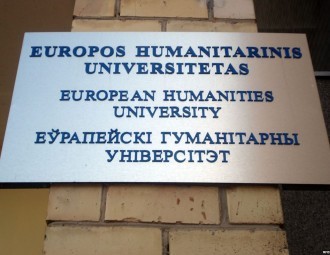Pavel Tserashkovich: Basically, Anatoly Mihailau is still EHU’s head

An American David Pollick is elected a new head of the EHU. The question is whether the university in exile manages to preserve at least the image of Belarusan vector of development.
Situation around the European Humanitarian University that is believed to be a Belarusan higher education institution in exile remains ambiguous.
As far back as last September Anatoly Mihailau left the position of the university’s head. He founded the university and was its head since the moment of university’s creation. For electing a new head EHU’s governing council founded a temporary body – an election committee.
Short-list of applicants to the position of the university’s head consisted of six people: three Belarusan citizens – EHU’s professor Tatsiana Shchytsova, the leader of “For Freedom” movement Aliaksandr Milinkevich, and historian Ales Krautsevich, as well as three US citizens – professor David Pollick, head of EHU’s development and communication Darius Udris, and the head of the Office for the Institute of International Education in Moscow Edward Roslaf.
Belarusan candidates expressed distrust to the EHU’s election committee, first of all in relation to non-transparency of its work. Moreover, after elections according to unofficial information the chosen American rejected his post. However, soon he was approved for the position of the EHU’s head.
Let us also note that the conflict in the EHU re the reform of the teaching stuff has been lasting for about two years now. Thus, the group of teachers that was against the politics of administration founded a platform “for a new EHU”. But since last October most of them lost their work due to non-continuation of work contracts.
Situation around elections of a new EHU’s head in the with the “EuroBelarus” Information Service described professor Pavel Tserashkovich, ex-head of the EHU Senate.
- How successful is the choice of an American citizen, who knows neither Belarusan nor Russian, for the position of the head of the Belarusan university?
- The fact that he is an American citizen isn’t a plus or a minus, though command of Russian or Belarusan would be useful. But the main thing is that we need a specialist with flawless reputation. In this relation there are a lot of claims to Mr. Pollick, especially taking into account the details of his career in the US Birmingham South College. This college with $12 billion budget ended with $12 billion shortfall after a six-year management under Mr. Pollick.
We should also add that Pollick is, basically, has been managing EHU for almost a year now. During this time about €1 billion shortfall has accumulated. All that proves that this is not the kind of specialist EHU needs.
- What are we to expect from a new university’s head?
- It is hard to say, how independent he is. For now the information that comes from the EHU says that de facto Anatoly Mihailau remains the head of the university. It means that the policy that led to the university’s crisis is most likely to continue.
- Aliaksandr Milinkevich suggested organizing reelections. How possible is that?
- It would be an adequate move if independent commission conducted the election, not the group that was closely acquainted with Pollick and that was, basically, on friendly terms with him.
The other question is who would take the liberty of organizing these elections. For now I don’t see a big group of people in the governing council that would be able to achieve that.
- Some suggest that EHU might lose its Belarusan vector of development and become an American-Russian university instead. Is it possible?
- Frankly speaking, the EHU has never been a really Belarusan national university. Belarusan component is present there, there are courses in Belarusan, and program is to a certain extent designed for Belarusans. But in general, there is no strategic orientation towards Belarus. These claims to the university are presented by donors and foreigners, who control higher education in Lithuania. It is known that the Education Ministry accredited the university last year; however, the EHU didn’t pass it completely, and the license is given for three years instead of six. The main claims are put not to the educational process, but to the level of strategic planning. According to this criterion, the university got negative assessment.
- How significant is the EHU for the Belarusan education system now?
- We can say that the EHU is substantially integrated into European system of higher education, in the bigger degree than any other Belarusan university. Thus, EHU is really important.
But if we take a group of Belarusans, who are studying abroad (according to some data we are talking about 25-30 thousand people there) the part of EHU in this group is quite insignificant.
-
03.01
-
07.10
-
22.09
-
17.08
-
12.08
-
30.09



























